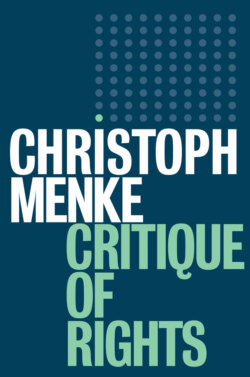Читать книгу Critique of Rights - Christoph Menke - Страница 6
Notes
Оглавление1 1. [Tr. – The adjective bürgerlich will generally be translated in what follows as “bourgeois,” though in some contexts it will be rendered as “civil,” e.g., when modifying Gesellschaft (“civil society”), since there is precedent for this in Menke’s citations of Hegel and Marx. The German word Recht can mean either “law” or “right.” In what follows, it will generally be translated as “law” except where “right” seems necessary due to context. The plural of Recht – Rechte – will generally be translated as “rights.” “Rights” or “a right” (ein Recht) refer to the subjective dimension in which rights are individual claims, while “law” or “right” without a definite or indefinite article [Recht] denotes the objective dimension in which “right” is a system of laws. The former involves the imposition of an obligation by one person upon another, while the latter is an “objective rule of law.” Gesetz will also generally be translated as “law” with the German in brackets.]
2 2. Karl Marx, “On the Jewish Question,” in: Marx and Engels Collected Works, vol. 3 (London: Lawrence & Wishart, 2010), 146–74, here 164.
3 3. And in which the “destiny” of human beings “to lead a universal life” is fulfilled (G.F.W. Hegel, Elements of the Philosophy of Right, trans. by H.B. Nisbet [Cambridge: Cambridge University Press, 1991, 276 [§ 258]).
4 4. Marx, “On the Jewish Question,” 165.
5 5. Marx, “On the Jewish Question,” 165.
6 6. Marx, “On the Jewish Question,” 166.
7 7. Marx, “On the Jewish Question,” 166 and 153 [Tr. – translation modified].
8 8. In Hegel’s sense of the word: as the “authority [Macht] of the universal that guarantees security” in civil society (Hegel, Elements of the Philosophy of Right, 260 [§ 231]). For Hegel, “police” means politics that maintain and secure civil society – thus the police are no longer “sovereign,” as they were in the (late-absolutist) “police state,” which claimed to rule society as a whole (Michel Foucault, The Birth of Biopolitics: Lectures at the Collège de France, trans. by Graham Burchell [London: Palgrave Macmillan, 2008], 7).
9 9. This thesis stands in strict contrast to a critique of rights that only recognizes content. Contra Marx, Duncan Kennedy formulates its basic thesis as follows: “[T]here is no more a legal logic to Liberal rights than there is an economic logic to capitalism” (Duncan Kennedy, “The Critique of Rights in Critical Legal Studies,” in: Wendy Brown and Janet Halley [eds.], Left Legalism/Left Critique [Durham/London: Duke University Press, 2002], 178–227, here 216). The only thing then left to say is that “Rights just means rules in force to protect particular interests” (210). What Marx writes in his critique of bourgeois economy holds for critical legal studies: “it has never once asked the question why this content takes on that form” [Tr. – translation modified] (Karl Marx, Capital, vol. 1, in: Marx and Engels Collected Works, vol. 35 [London: Lawrence & Wishart, 1996], 91f.). Sonja Buckel argues along these lines in Subjektivierung und Kohäsion: Zur Rekonstruktion einer materialischen Theorie des Rechts (Weilerswist: Velbrück, 2007), 226.
10 10. Marx, “On the Jewish Question,” 153.
11 11. The legitimate objection to the contrary is that, with the critique of the egoism of rights, Marx merely reproduced a specific historical ideology of rights that is unnecessary for its (bourgeois) form. Cf. Jürgen Habermas, “Natural Law and Revolution,” in his Theory and Practice, trans. by John Viertel (Boston: Beacon, 1973), 82–120. See also Claude Lefort, “Human Rights and Politics,” in: The Political Forms of Modern Society: Bureaucracy, Democracy, Totalitarianism, trans. by Alan Sheridan (Cambridge: MIT Press, 1986), 239–72.
12 12. For preliminary thoughts on this, see Christoph Menke, Reflections of Equality, trans. by Howard Rouse and Andrei Denejkine (Stanford: Stanford University Press, 2006). In my earlier studies of the critique of law I did not make the necessary break with liberalism clearly enough; cf. Christoph Menke, “From the Dignity of Man to Human Dignity: The Subject of Rights,” in: Values and Norms in the Age of Globalization, ed. by Ewa Czerwińska-Schupp (Bern: Peter Lang, 2007), 83–94. For a first step in this direction, see “Subjektive Rechte: Zur Paradoxie der Form,” in: Nach Jacques Derrida und Niklas Luhmann: Zur (Un-)Möglichkeit einer Gesellschaftstheorie der Gerechtigkeit (Stuttgart: Lucius & Lucius, 2008), 81–108.
13 13. Karl Marx, “Contribution to the Critique of Hegel’s Philosophy of Law,” in: Marx and Engels Collected Works, vol. 3, 3–129, here 91.
14 14. Karl Marx, “On the Jewish Question,” 167 [Tr. – translation modified].
